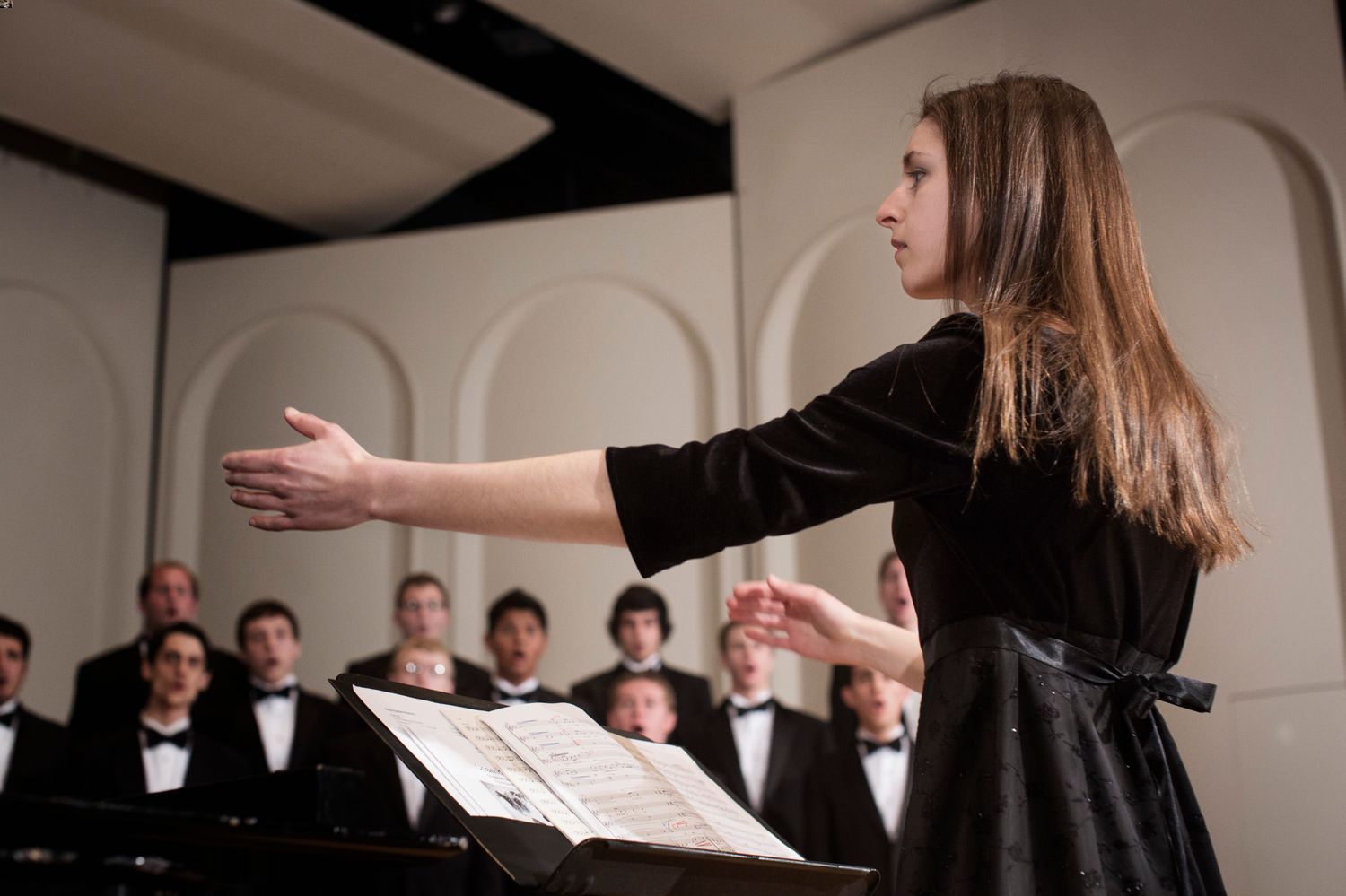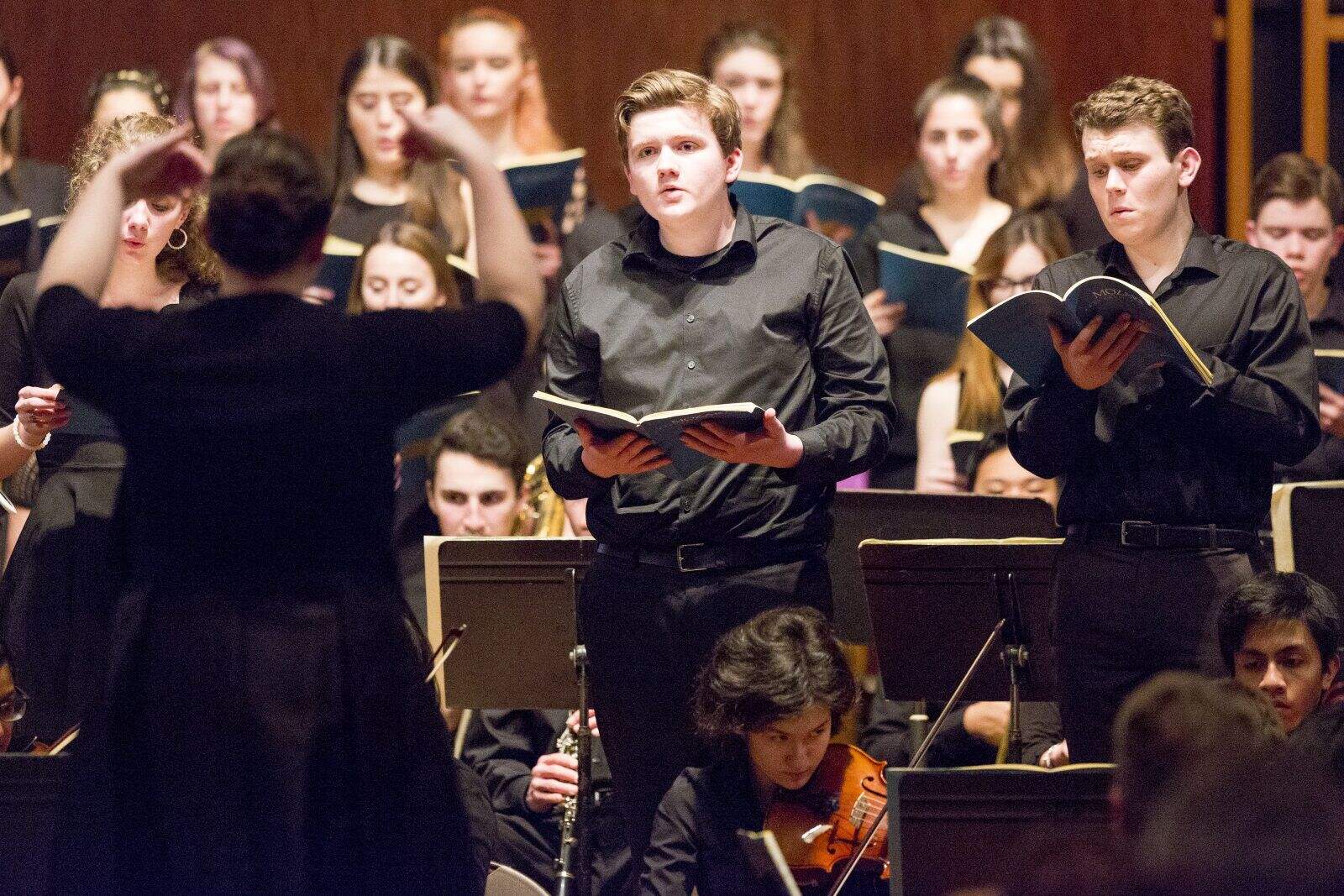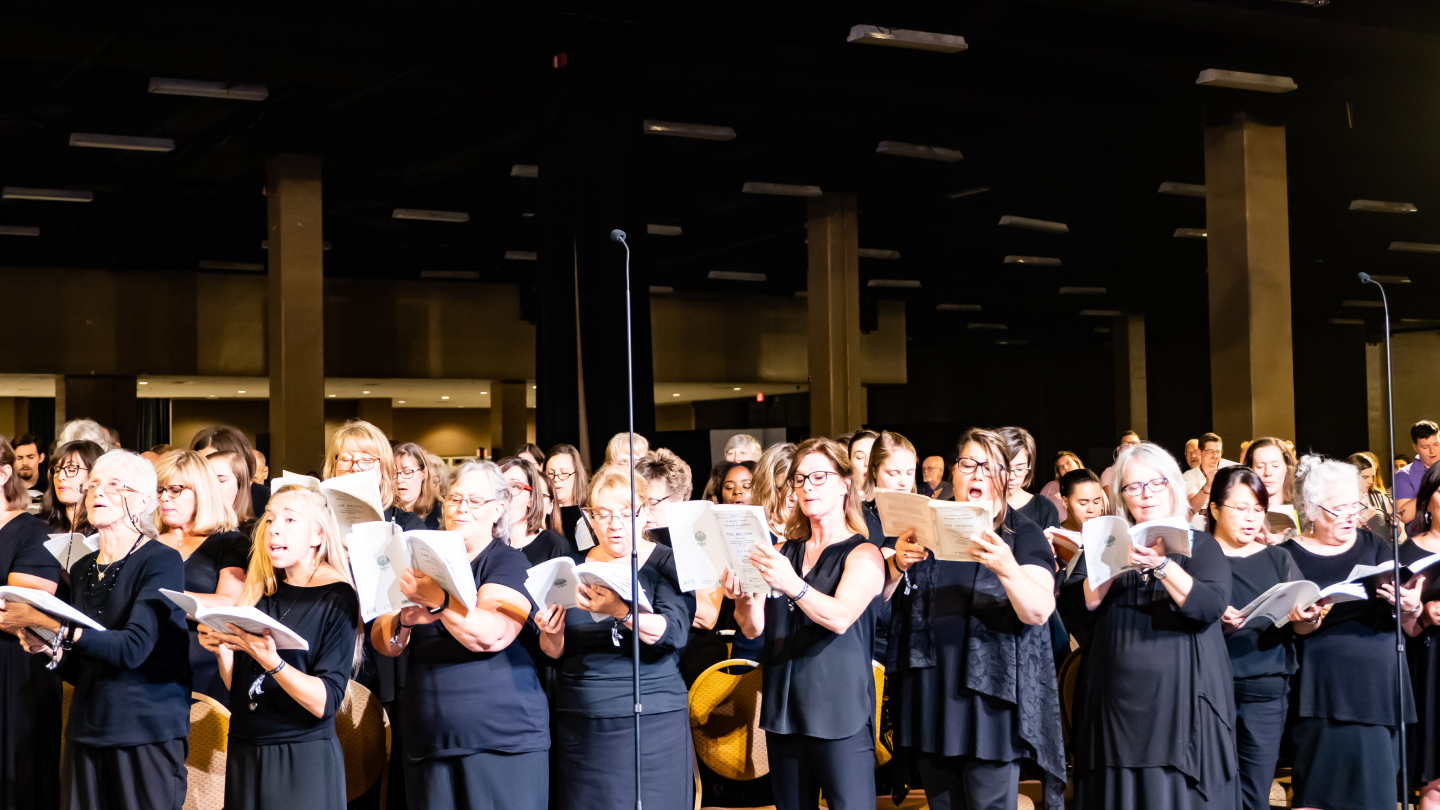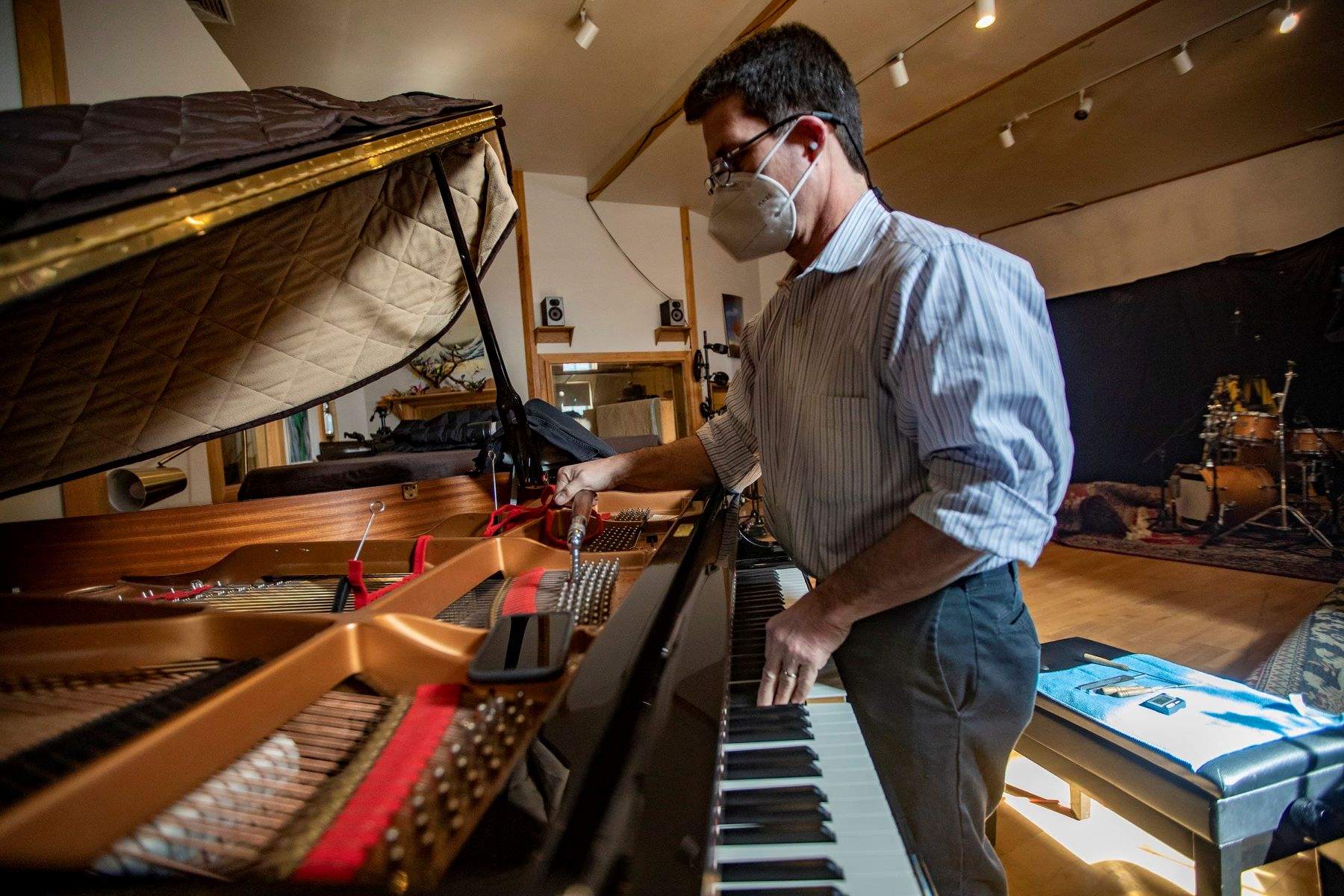Home>Production & Technology>Choir>How To Become Choir Director


Choir
How To Become Choir Director
Published: February 23, 2024
Learn the essential steps to become a choir director and lead your own vocal ensemble with confidence and skill. Discover the path to mastering choir leadership and musical direction.
(Many of the links in this article redirect to a specific reviewed product. Your purchase of these products through affiliate links helps to generate commission for AudioLover.com, at no extra cost. Learn more)
Table of Contents
Introduction
Becoming a choir director is a rewarding and enriching journey for those passionate about music, leadership, and artistic expression. As a choir director, you have the opportunity to inspire and guide a group of diverse individuals in creating harmonious melodies that resonate with audiences on a profound level. This role requires a unique blend of musical expertise, leadership skills, and a deep understanding of choral dynamics. Whether you are an aspiring musician or an experienced vocalist looking to transition into a leadership position, embarking on the path to becoming a choir director is an exciting and fulfilling endeavor.
In the following sections, we will delve into the multifaceted aspects of becoming a choir director, including the essential educational and musical training, leadership and communication skills, rehearsal techniques, and the intricate art of conducting. We will explore the intricacies of building and maintaining a choir, collaborating with accompanists and musicians, and the meticulous preparation required for outstanding performances. Additionally, we will discuss career development opportunities and the diverse pathways available for aspiring choir directors to flourish in the realm of choral music.
Embarking on the journey to become a choir director is a commitment to continuous learning, artistic growth, and the cultivation of a vibrant musical community. This profession offers a platform to foster creativity, mentorship, and the joy of collaborative music-making. As we navigate through the various facets of this esteemed role, you will gain valuable insights into the skills, knowledge, and dedication required to thrive as a choir director in today's dynamic musical landscape.
Education and Training
Becoming a proficient choir director necessitates a strong foundation in music education and choral training. Pursuing a formal education in music, such as a degree in music education, choral conducting, or vocal performance, provides aspiring choir directors with a comprehensive understanding of music theory, vocal techniques, and conducting principles. A bachelor's degree in music or a related field serves as an essential stepping stone towards acquiring the necessary skills and knowledge to excel in this role.
Furthermore, pursuing advanced degrees, such as a Master of Music in Choral Conducting or Music Education, can significantly enhance a choir director's expertise. These programs often offer specialized coursework in choral literature, vocal pedagogy, score analysis, and advanced conducting techniques. Additionally, engaging in practical experiences, such as conducting choirs and working closely with experienced mentors, can further refine a director's musical acumen and leadership abilities.
In addition to formal education, participating in workshops, seminars, and choral conferences can provide valuable opportunities for networking, skill development, and exposure to diverse choral traditions. These events often feature renowned choral conductors and educators who share their insights, techniques, and artistic philosophies, enriching the learning journey of aspiring choir directors.
Moreover, obtaining certifications in music education or choral conducting can demonstrate a director's commitment to professional growth and proficiency in the field. Organizations such as the American Choral Directors Association (ACDA) offer certification programs and resources designed to support the ongoing development of choir directors, ensuring that they stay abreast of current trends, best practices, and pedagogical innovations within the choral community.
Ultimately, the journey to becoming a choir director is an ongoing process of learning, refinement, and dedication to the art of choral music. By embracing a combination of formal education, practical experiences, and continuous professional development, aspiring choir directors can cultivate the expertise and artistic vision necessary to lead and inspire vocal ensembles with confidence and artistry.
Musical Skills and Knowledge
Becoming a choir director necessitates a profound command of musical skills and knowledge to effectively lead and inspire vocal ensembles. A comprehensive understanding of music theory, vocal technique, and choral repertoire is paramount in guiding singers towards artistic excellence. Aspiring choir directors should possess a strong grasp of music theory, including harmony, counterpoint, and form, enabling them to analyze and interpret choral scores with precision and insight. Moreover, a thorough understanding of vocal pedagogy and choral techniques equips directors with the expertise to nurture singers' vocal abilities and cultivate a unified choral sound.
In addition to theoretical knowledge, proficiency in score reading and analysis is essential for choir directors to interpret and convey the composer's intentions effectively. This includes the ability to discern intricate musical nuances, dynamics, and phrasing, allowing directors to shape the choir's performance with artistry and precision. Furthermore, a broad knowledge of choral repertoire spanning various musical genres, historical periods, and cultural traditions empowers directors to curate diverse and compelling programs that resonate with both performers and audiences.
Moreover, possessing strong conducting skills is fundamental for choir directors to communicate musical nuances, cue entrances, shape phrases, and maintain ensemble cohesion. Effective conducting techniques encompass clear and expressive gesture, fluid beat patterns, and the ability to convey musical interpretations through physical communication. Adept conducting facilitates a seamless and intuitive connection between the director, singers, and the music, resulting in cohesive and compelling performances.
Furthermore, a keen ear for intonation, blend, and vocal timbre enables directors to identify and address technical and artistic aspects of the choir's sound, fostering a polished and resonant vocal blend. Additionally, the ability to provide constructive feedback and vocal coaching to individual singers and sections is crucial for refining the choir's overall musicality and expression.
In essence, the acquisition and refinement of musical skills and knowledge are foundational pillars for aspiring choir directors. By honing their expertise in music theory, vocal technique, choral repertoire, conducting, and vocal coaching, directors can lead their choirs with confidence, artistry, and a deep commitment to musical excellence.
Leadership and Communication
Effective leadership and communication are integral components of the choir director's role, shaping the ensemble's cohesion, artistic vision, and collaborative spirit. As the musical steward of the choir, the director's leadership extends beyond musical direction to encompass mentorship, motivation, and the cultivation of a supportive and inclusive choral community.
Leadership in the choral context entails fostering a nurturing and inspiring environment where singers feel valued, motivated, and empowered to contribute to the collective musical journey. This involves cultivating a culture of respect, teamwork, and open dialogue, where each choir member's unique voice and perspective are embraced. By fostering an inclusive and supportive atmosphere, choir directors can harness the collective talents and creativity of the ensemble, fostering a sense of shared ownership and artistic investment in the choral experience.
Furthermore, effective communication lies at the heart of successful choral leadership. Choir directors must adeptly convey musical concepts, interpretive insights, and rehearsal objectives to the ensemble in a clear, engaging, and encouraging manner. This includes articulating artistic visions, providing constructive feedback, and fostering a sense of shared musical understanding within the choir. Additionally, adept communication extends to facilitating productive dialogue among choir members, promoting a culture of active listening, collaboration, and mutual respect.
Moreover, leadership in the choral realm encompasses mentorship and personal development, where directors guide singers in honing their vocal skills, musical interpretation, and artistic expression. This involves recognizing and nurturing the unique strengths of individual choir members while fostering a collective sense of growth, unity, and artistic exploration within the ensemble.
In essence, effective leadership and communication form the cornerstone of a vibrant and thriving choral community. By embodying inspirational leadership, fostering open and constructive communication, and nurturing the artistic and personal growth of choir members, directors can cultivate a musical environment that resonates with creativity, unity, and the joy of collaborative music-making.
Rehearsal Techniques
Rehearsal techniques are the bedrock of a choir director's ability to shape and refine the ensemble's musicality, cohesion, and expressive depth. A well-conducted rehearsal is a dynamic and purposeful space where singers are guided through a process of musical exploration, refinement, and collective artistry. The following are essential rehearsal techniques that empower choir directors to maximize the ensemble's potential and foster a culture of musical excellence.
Structured Planning
Effective rehearsal techniques begin with meticulous planning and organization. Choir directors meticulously structure rehearsal schedules, delineating specific objectives, repertoire focus, and targeted areas for musical refinement. By crafting a detailed roadmap for each rehearsal, directors ensure that time is utilized efficiently, and the ensemble's musical growth is systematically nurtured.
Vocal Warm-Ups and Technique
Commencing rehearsals with vocal warm-ups and technique exercises is fundamental to preparing the choir for the artistic journey ahead. These exercises encompass vocalization, breath control, diction, and resonance, fostering vocal agility, unity, and a polished choral sound. Warm-ups also serve as an opportunity for directors to assess the ensemble's vocal health and address any technical concerns.
Score Analysis and Interpretation
Engaging in in-depth score analysis and interpretation during rehearsals allows directors to illuminate the musical nuances, textual meaning, and expressive elements embedded within the repertoire. By guiding singers through a comprehensive exploration of the score, directors cultivate a deep understanding of the music's narrative, emotional landscape, and stylistic nuances, enriching the ensemble's interpretive depth.
Sectional and Ensemble Rehearsal
Directors employ sectional and ensemble rehearsal techniques to refine vocal blend, balance, and ensemble cohesion. Sectional rehearsals enable individual vocal sections to focus on intricate passages, intonation, and vocal unity, while ensemble rehearsals facilitate the integration of diverse vocal timbres into a seamless and resonant choral sound.
Artistic Interpretation and Expression
Fostering artistic interpretation and expressive depth is central to rehearsal techniques. Directors guide singers in exploring musical phrasing, dynamics, articulation, and emotive storytelling, fostering a nuanced and compelling performance. This involves delving into the historical context, cultural significance, and emotive essence of the repertoire, empowering singers to convey a profound and authentic musical narrative.
Feedback and Reflection
Encouraging open dialogue, constructive feedback, and reflective dialogue is integral to the rehearsal process. Directors create a supportive environment where singers feel empowered to express their insights, vocal concerns, and artistic aspirations, fostering a culture of mutual growth and artistic collaboration within the ensemble.
In essence, adept rehearsal techniques are a testament to a choir director's artistry, leadership, and commitment to nurturing a vibrant and polished choral sound. By employing structured planning, vocal warm-ups, score analysis, ensemble refinement, artistic exploration, and open dialogue, directors cultivate a rehearsal environment that fosters musical excellence, collective artistry, and the joy of collaborative music-making.
Building and Maintaining a Choir
Building and maintaining a choir is a multifaceted endeavor that requires vision, dedication, and a deep commitment to nurturing a vibrant musical community. As a choir director, the process of establishing and sustaining a choir extends beyond assembling a group of singers to encompass fostering a culture of artistic excellence, camaraderie, and shared musical passion.
The initial phase of building a choir involves casting a wide net to attract diverse and talented singers who share a passion for choral music. This may entail conducting auditions, outreach programs, and engaging with local vocal communities to identify individuals who embody the artistic spirit and vocal proficiency essential for a thriving choir. Embracing inclusivity and diversity in the recruitment process enriches the ensemble's artistic tapestry, fostering a dynamic and inclusive choral community.
Once the choir is assembled, the process of maintaining and nurturing the ensemble begins. Choir directors play a pivotal role in fostering a supportive and collaborative environment where singers feel valued, inspired, and connected to the collective musical journey. This involves cultivating a culture of respect, teamwork, and open communication, where each choir member's unique voice and perspective are embraced. By fostering a sense of shared ownership and artistic investment in the choral experience, directors lay the foundation for a cohesive and thriving musical community.
Moreover, maintaining a choir encompasses ongoing vocal development, artistic exploration, and the cultivation of a unified choral sound. Directors guide singers in honing their vocal skills, exploring diverse musical genres, and delving into the emotional and narrative dimensions of the repertoire. This involves nurturing a culture of continuous learning, artistic growth, and the joy of collaborative music-making, ensuring that the choir remains a dynamic and vibrant artistic entity.
Furthermore, fostering a strong sense of community and camaraderie within the choir is essential for its longevity and artistic fulfillment. Directors organize social events, team-building activities, and opportunities for singers to connect beyond rehearsals, fostering meaningful bonds and a shared sense of purpose within the ensemble. By cultivating a supportive and inclusive choral community, directors ensure that the choir becomes a source of artistic inspiration, personal growth, and enduring camaraderie for its members.
In essence, building and maintaining a choir is a labor of love that requires a harmonious blend of artistic vision, leadership, and a deep reverence for the transformative power of choral music. By embracing inclusivity, fostering a culture of artistic excellence, and nurturing a vibrant and cohesive choral community, directors lay the groundwork for a musical journey that resonates with creativity, unity, and the joy of collective artistic expression.
Working with Accompanists and Musicians
Collaborating with accompanists and musicians is a pivotal aspect of a choir director's role, enriching the ensemble's musical tapestry and elevating the depth of choral performances. Accompanists, often pianists, provide invaluable support by enhancing vocal presentations with harmonic richness, rhythmic precision, and expressive nuances. Directors must cultivate a collaborative and symbiotic relationship with accompanists, ensuring seamless coordination and mutual musical understanding.
Effective communication is fundamental in working harmoniously with accompanists. Directors articulate interpretive insights, tempo fluctuations, and expressive nuances, fostering a shared musical vision that enhances the cohesion and artistry of the performance. Through open dialogue and collaborative exploration, directors and accompanists coalesce their artistic interpretations, creating a unified musical narrative that resonates with depth and emotive authenticity.
Moreover, directors guide accompanists in navigating complex choral scores, providing clarity on vocal entrances, dynamic shifts, and ensemble interactions. This collaborative synergy empowers accompanists to tailor their accompaniments to the choir's expressive nuances, fostering a seamless and resonant musical tapestry that elevates the ensemble's collective artistry.
In addition to working with accompanists, choir directors collaborate with instrumental musicians to augment choral performances with orchestral, chamber, or band accompaniment. This collaborative endeavor requires directors to orchestrate the integration of vocal and instrumental elements, ensuring a balanced and cohesive musical presentation. Directors meticulously coordinate rehearsals, facilitating ensemble interactions, and refining the ensemble's blend with instrumental accompaniment.
Furthermore, directors foster a culture of mutual respect and artistic collaboration between singers and instrumentalists, nurturing a cohesive and unified musical entity. By cultivating a shared sense of musical purpose and artistic investment, directors harmonize vocal and instrumental elements, creating performances that resonate with depth, emotive resonance, and a vibrant fusion of vocal and instrumental artistry.
In essence, working with accompanists and musicians is a testament to a choir director's ability to orchestrate collaborative musical endeavors that transcend individual contributions, culminating in performances that resonate with unity, depth, and the transformative power of collective artistic expression. Through adept communication, collaborative exploration, and a deep reverence for musical synergy, directors elevate choral performances to profound artistic heights, uniting vocal and instrumental elements in a harmonious and resonant musical tapestry.
Performance Preparation and Conducting
Performance preparation and conducting are pivotal phases in the choir director's journey, encompassing meticulous planning, artistic refinement, and the orchestration of compelling choral presentations. As the culmination of intensive rehearsals and artistic exploration, performances showcase the choir's musical prowess, emotive depth, and transformative power, making the preparation and conducting of these events a defining aspect of the director's role.
The process of preparing for a performance begins with strategic planning that encompasses repertoire selection, thematic cohesion, and artistic vision. Choir directors meticulously curate programs that showcase a diverse and engaging musical narrative, drawing from a rich tapestry of choral repertoire spanning various genres, historical periods, and cultural traditions. This deliberate selection of repertoire reflects the director's artistic vision and the ensemble's vocal strengths, ensuring that performances resonate with depth, emotive resonance, and artistic diversity.
Moreover, performance preparation involves refining vocal technique, ensemble cohesion, and expressive depth in the lead-up to the event. Directors guide singers through intensive rehearsals, focusing on nuances of interpretation, emotive storytelling, and the seamless integration of vocal elements. This phase of artistic refinement cultivates a unified choral sound, compelling storytelling, and a profound connection between the choir and the music, setting the stage for a compelling and resonant performance.
Conducting, the art of guiding the choir through the musical journey, is a testament to the director's command of musical interpretation, expressive communication, and ensemble coordination. As the conductor, directors shape the choir's performance through fluid and expressive gestures, nuanced conducting techniques, and a deep understanding of the score's emotive nuances. This orchestration of musical interpretation and ensemble cohesion empowers directors to convey the composer's intentions, shape the choir's emotive narrative, and elicit a profound and authentic musical performance.
Furthermore, directors navigate the intricacies of performance logistics, including stage setup, sound reinforcement, and collaborative coordination with accompanists and instrumentalists. This orchestration of logistical elements ensures a seamless and immersive performance experience, allowing the choir to convey their artistic narrative with clarity, depth, and technical precision.
In essence, performance preparation and conducting epitomize the choir director's ability to orchestrate transformative and immersive musical experiences. Through meticulous planning, artistic refinement, and expressive conducting, directors lead their choirs through a journey of emotive storytelling, artistic resonance, and the transformative power of collective musical expression.
Career Development and Opportunities
The realm of choral music offers a myriad of career development opportunities for aspiring choir directors, encompassing a diverse array of professional pathways, artistic collaborations, and leadership roles within the vibrant landscape of choral music. As choir directors embark on their professional journey, they are presented with a rich tapestry of opportunities to expand their artistic horizons, refine their leadership skills, and contribute to the dynamic evolution of choral music.
One avenue of career development for choir directors is the pursuit of advanced degrees and certifications in choral conducting, music education, or vocal pedagogy. Advanced studies provide directors with specialized training, mentorship opportunities, and exposure to diverse choral traditions, enriching their artistic perspective and enhancing their expertise in the field. Additionally, certifications from esteemed organizations such as the American Choral Directors Association (ACDA) serve as a testament to a director's commitment to professional growth and proficiency in choral leadership.
Furthermore, choir directors can explore opportunities for artistic collaborations with renowned choral ensembles, orchestras, and music festivals, broadening their musical repertoire, and fostering collaborative partnerships within the global choral community. Engaging in guest conducting, artistic residencies, and choral workshops allows directors to share their expertise, mentor emerging musicians, and contribute to the enrichment of choral music on a broader scale.
The realm of academia also presents compelling career pathways for choir directors, encompassing roles as choral educators, music professors, and artistic directors within educational institutions and conservatories. By imparting their knowledge, artistic vision, and leadership acumen to the next generation of musicians, directors play a pivotal role in shaping the future of choral music and nurturing emerging talent within the academic sphere.
Moreover, the entrepreneurial landscape offers directors the opportunity to establish their own vocal ensembles, choral organizations, or music education initiatives, fostering innovative and inclusive platforms for artistic expression and community engagement. By spearheading artistic ventures, directors can cultivate unique artistic identities, promote cultural diversity, and contribute to the democratization of choral music within their communities.
In essence, the career development opportunities for choir directors are as diverse and dynamic as the choral music they champion. By embracing a spirit of continuous learning, artistic exploration, and collaborative engagement, directors can carve out vibrant and fulfilling career pathways that resonate with artistic excellence, mentorship, and the enduring joy of collective music-making.
Conclusion
In conclusion, the journey to becoming a choir director is a testament to the harmonious convergence of musical expertise, leadership acumen, and a deep reverence for the transformative power of choral music. Aspiring choir directors embark on a multifaceted odyssey that encompasses rigorous musical training, leadership development, and the cultivation of vibrant and cohesive choral communities. Through a harmonious blend of artistic vision, mentorship, and continuous learning, directors orchestrate transformative musical experiences that resonate with emotive depth, unity, and the enduring joy of collective artistic expression.
The role of a choir director extends far beyond musical direction, encompassing mentorship, artistic leadership, and the cultivation of inclusive and supportive choral communities. By fostering a culture of respect, collaboration, and artistic exploration, directors empower singers to embrace their unique voices, contribute to a collective musical narrative, and embark on a journey of artistic growth and fulfillment. This dedication to nurturing a vibrant musical community lays the groundwork for compelling performances, enduring camaraderie, and the enduring legacy of choral music.
Furthermore, the career pathways available to choir directors are as diverse and dynamic as the choral music they champion. From academic pursuits to artistic collaborations and entrepreneurial ventures, directors have the opportunity to shape the future of choral music, mentor emerging talent, and contribute to the enrichment of global musical landscapes. This expansive array of opportunities reflects the enduring relevance and transformative power of choral music in today's dynamic artistic milieu.
In essence, the journey to becoming a choir director is an odyssey of artistry, leadership, and the enduring pursuit of musical excellence. By embracing a spirit of continuous learning, artistic exploration, and collaborative engagement, directors cultivate vibrant and fulfilling careers that resonate with mentorship, artistic innovation, and the enduring joy of collective music-making. The role of a choir director stands as a testament to the profound impact of choral music in fostering unity, creativity, and the transformative power of collective artistic expression.











